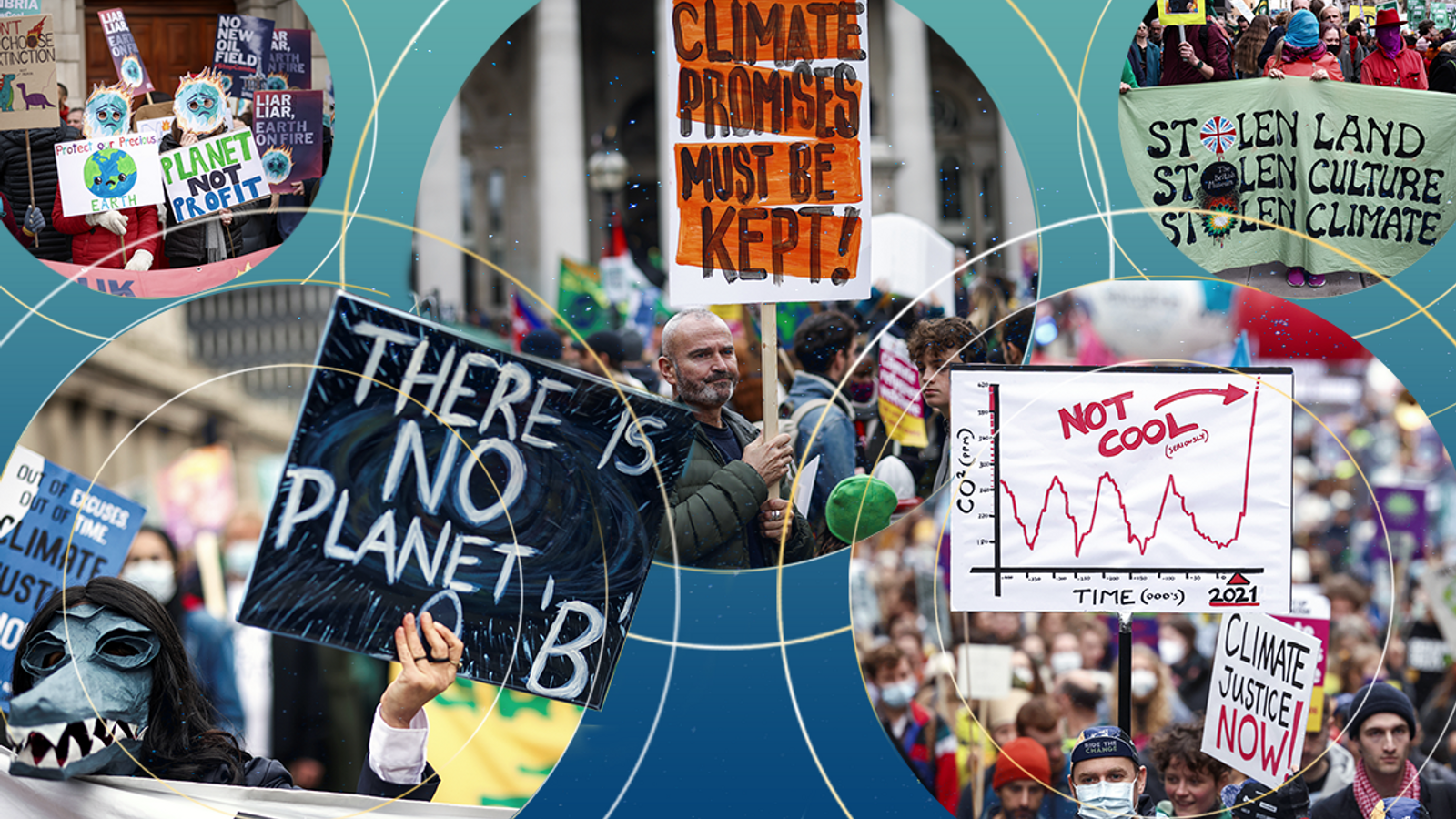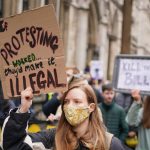Pouring rain and strong wind appeared not to dampen the spirits of the thousands of climate protesters marching through Glasgow.
Protesters dressed head to toe in leaves, activists with animal figures on sticks, 30-piece bands, trade unionists and visitors from around the world turned out for the march, gathering in Kelvingrove Park and making their way to Glasgow Green.
And in a way, the weather was fitting for these marchers demanding urgent climate action, for the UK’s climate is already changing, already wetter, with winters set to become wetter still.
Steve Banks and his dog Archie usually walk in the countryside around Lochwinnoch, Renfrewshire, but today they were walking through Glasgow.
He says winters used to be snowy and cold and are now wild and wet. Summers are drier, he says, almost drying up some rivers.
“My biggest concern is my generation and those either side have wasted the planet and done little about it,” he said.
Samba bands and sound systems lifted the mood as they led dancers through the soaked streets.
COP26: In some ways Greta Thunberg is wrong to call the summit a ‘failure’ and ‘PR event’
COP26: Five big supermarkets to halve environmental impact of weekly food shop by 2030
Global Day of Action: Tens of thousands to march in Glasgow against climate change alongside millions around the world as city hosts COP26
But beyond the dogs and witty banner slogans – “earth wind and no fire” and “not cool” – voices of indigenous and frontline communities were front and centre.
Organisers attempted to order the march in groups, and had given them the front position. Likewise at Friday’s youth march, the speaker’s platform was dedicated predominantly to indigenous and most affected voices, where Greta Thunberg told young protesters that COP26 was a celebration of “business as usual”.
Activists said COP26 did not give an equal voice to people from these communities, with COVID-19 and costs both barriers to accessing the summit.
Today, Colombian indigenous group Minga Indigena led the way, followed by protesters from all over, including Tibet, Sri Lanka, the United States and beyond.
Marching near the front with a Tibetan group was Puma Chodon, a Tibetan nurse who had travelled from London, where she works. For her, racial justice is climate justice in Tibet, where China is accused of suppressing cultural and religious freedom.
Speaking of climate change impacting rivers like the Mekong, Ganges, and Yangtze that start in Tibet, she said: “If Tibet runs dry… it is going to hit almost one fifth of the world population.
“The climate justice is not just for Tibetans, but it’s for all of us.”
Marvine Newton was leading the anti-racism and migrant justice group, second in the procession.
“A lot of migrant voices are being silenced in the conversation,” she said.
“It’s not OK for those who are more affected, not to have the equivalent power to change their outcomes,” she said, saying that COP26 has “whitewashed” the issue and “[tokenised] our voices”.
She wants debt cancellations for poor countries and Britain acknowledging its colonial past.
Gayani Ariyratani, from Sri Lanka and now living in Birmingham, called the music, words, and performances by indigenous groups “very overpowering” and “emotional”.
Even though they spoke in a language she didn’t know, she said it was still “very moving just to see the world come together in one place.”
Subscribe to ClimateCast on Spotify, Apple Podcasts, or Spreaker
For full coverage of COP26, watch Climate Live on Sky channel 525.
Follow live coverage on web and app with our dedicated live blog.
Get all the latest stories, special reports and in-depth analysis at skynews.com/cop26






















